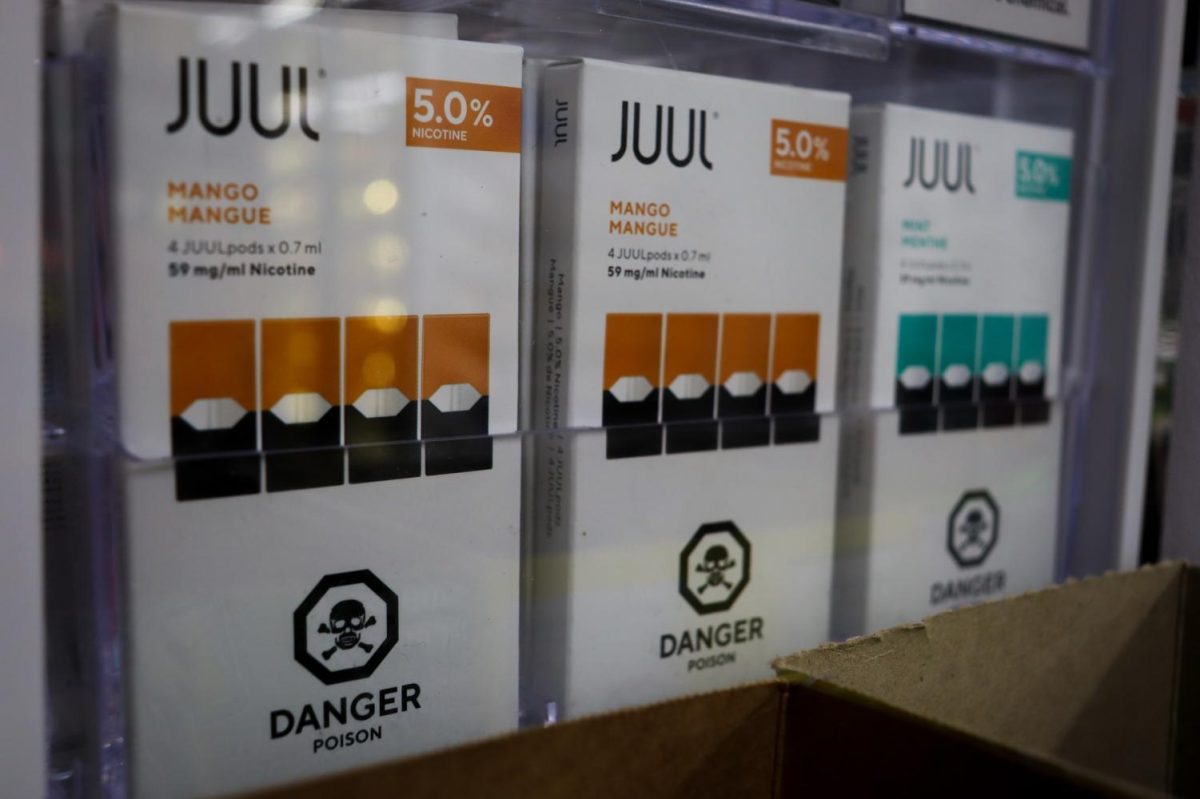Federal enactments, coupled with widespread media coverage, have impacted students’ health awareness and use of electronic-cigarette products since September of last year.
The spike in e-cigarette-related health emergencies hit its peak September 2019. According to the Center for Disease Control, there has been a total of 2,668 hospitalized cases of e-cigarette product use-associated lung injuries in the country as of Jan. 14.
According to the CDC, 14% of these cases were reportedly related to strictly nicotine-containing e-cigarette products while 82% of hospitalized patients were reported using THC-containing vape products.
Since the spike in September, emergency department visits directly related to vape products have consistently declined, according to the CDC. According to studies conducted by the CDC, a strong correlation exists between the aforementioned medical emergencies and Vitamin C Acetate, an additive found in THC-containing vape juices.
Director of the Student Health Center Dr. Emilio Carranco said the media coverage of vape-related health incidents raised student awareness of possible side effects, but the center has yet to encounter any specific cases.
“I think because of the issues around lung illness and vaping we had a lot more students coming in concerned about the symptoms they were experiencing, and of course our providers here were on alert looking for particular symptoms,” Carranco said. “We had quite a few students that we evaluated, but fortunately we didn’t find any students who met the criteria for that kind of illness, and I am not aware of any student that was hospitalized for a vaping related illness.”
The CDC recommends e-cigarette consumers to use FDA-approved smoking cessation methods and medication if concerned about the health effects of vape products.
Carranco said the belief vaping is a healthier alternative to traditional smoking is a misconception due to nicotine’s addictive properties.
“Initially vaping was marketed as a safer alternative to smoking tobacco, but the truth is as researchers look at vaping they’re discovering more and more problems. It’s better in some ways but worse in others,” Carranco said. “The fact that it can deliver much higher levels of nicotine to the brain is significant because you’re actually increasing the risk that people will become addicted to nicotine, not decreasing it.”
Since the outbreak of e-cigarette-related health cases that began September 2019, various actions have been taken to mitigate the availability of these products. The legal age for purchasing all tobacco products was raised to 21 Dec. 27, 2019, signed into law by President Trump as a part of a spending bill. Additionally, a ban on most flavored e-cigarette products was proposed as of Jan. 2.
Garrett Stapleton, Marvelous Smoke shop employee, said the federal legal age enactment has noticeably impacted business due to the removal of the grandfather clause used by the state of Texas.
“Since the fall semester we’ve had to deny more and more people, and since that federal bill we’ve had to deny a ton more,” Stapleton said. “It’s been way slower these past few weeks, probably because there aren’t many students in town but sales have definitely gone down a good amount.”
The ban on flavored e-cigarette products does not include menthol and tobacco flavors, despite research indicating menthol is the most popular among young smokers.
The federal ban will affect only particular types of flavored vape juice products and merchants that sell vape products, including Stapleton, question the judgment by federal lawmakers.
“They’re getting rid of all pre-packaged flavors. Bottles of juice aren’t going to be affected but most of these pods will go away. They actually left out disposable vapes apparently, which doesn’t really make sense at all since I would say disposables are even more attractive to younger people,” Stapleton said. “It’s almost like they haven’t witnessed what’s actually selling in shops when they’re making laws.”
The FDA requires more information before declaring a concise stance on the prospects of this proposed ban. While the FDA indicates flavored products are more appealing to young consumers, the administration also acknowledges the potential of these products helping adult smokers transition to less harmful tobacco products.
Tahlia Sehon, English junior, said flavor variety assisted with cigarette smoking cessation and that proper identification should be prioritized over limiting options.
“I used to smoke cigarettes all the time, quitting is already difficult enough,” Sehon said. “Having a variety of flavors really helps people get off of the bad stuff, there should be more options but people should be tighter about ID. I’ve been to several shops and they didn’t ID me once.”
Full enforcement of the FDA’s ban will begin May 12 according to the guidance document on its website.
For more information on illnesses related to vaping products, visit the  FDA’s website.
Categories:
Flavored vape products take a hit from federal action
January 23, 2020
Since the outbreak of e-cigarette-related health cases that began September 2019, actions have been taken to mitigate the availability of these products. A ban on flavored e-cigarette products has been proposed on Jan. 2, and full-enforcement of the ban will soon be disciplined.
0
Donate to The University Star
Your donation will support the student journalists of Texas State University. Your contribution will allow us to purchase equipment and cover our annual website hosting costs.
More to Discover















